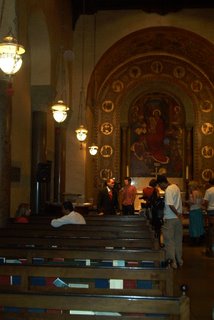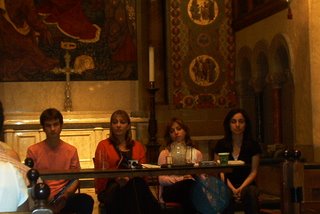Lebanon Evacuees Speak In New York Church

When asked the question "How was the situation where you were staying in Beirut?", Yasmin Hamidi, a 25-year-old New York native, talks non stop for about ten minutes about bombs, frightened children, sleepless nights, being glued to the TV for news, the dangerous drive to the embassy and then says "Sorry, I'm kind of angry."
Anger (towards the US and Israeli governments) , frustration (at the biased media coverage) and guilt (at leaving friends and family behind) is what drove Yasmin and three other evacuees to speak up at St. Bartholomew's Church last night during a briefing organized by the Network of Arab-American Professionals of New York (NAAP-NY).
"People ask me if I am happy to be back," Stephen MacInerney, from North Carolina, told the more than 100 attendees,"well I haven't been happy for one minute."
Stephen, a graduate student at Beirut's American University is concerned about his Lebanese friends. "When I was there I could at least talk to them over the phone and know that they were alive say an hour ago," he explains, "it is much harder to talk to people from here." For the first time in his life he is depressed and getting back here doesn't make things better. "It is strange to hear people talking about normal things."
Ayah Bdeir, a 24-year-old a Lebanese and Canadian citizen, relates with Stephen's sense of being strongly removed. "As I walked here I felt guilty," she said,"because I escaped". Ayah, who decided to read a statement from a paper because she feared not to be able to stay collected while talking, breaks down after reading one sentence. "I was right," she whispered while wiping her eyes.
Lina Shehayeb, from Bronxville, who was spending the summer with her parents in Lebanon, took the embassy's advice to stick it out a few more days because of the large amount of people waiting for evacuation. Meanwhile she helped out at a local school where refugees were camping out. "There were mostly women and children. Babies were laying on the floor," she recalls, "It was hearthbreaking to look at the children because they are innocent."
Yasmin, Ayah and Lina were vacationing in Lebanon, as were many foreign nationals. According to Stephen, tourism in Lebanon had just been restored to pre-civil war level.

From left to right: Stephen, Lina, Ayah and Yasmin
"My aunt was in Beirut 24 years ago. She had to decide to stay in the house or leave for a safer place.When she fled, the car she was in got bombed," Yasmin said, "That was the reason she came to the US: for skin restoration and to get the feeling in her fingers back. Now she found herself in Beirut having to make that same decision again."
Last Saturday, Lina was evacuated by ship with her 17 and 19-year-old sons. They reached home Tuesday night. "The evacuation was poorly organized, the government did not do a good job," she claims, "but the people on the ground did". Lina commends the US marines for giving up their suites in the hotel to refugees and sleeping on the ground. "The marines were fabulous. They were extremely patient with us and did more than they should."
Yasmin was surprised that there was no coordination between the US and Israeli government regarding their safety. When asked what road to take to the embassy on the day of the evacution, no advice was given. " We do not know where Israel is going to bomb next," an embassy representive told them. She feels the US has given Israel a green light for the bombings. "How can my government let this happen to people? They are going to hate us as long this is going on. It doesnt take rocket science to figure this out," she said.
"There is no way this is going to benefit Israel," alleged Stephen, a student of Middle Eastern studies, "Hezbollah exists because of the invasion in the 80's so how are they going to gain from this?" He also believes, from what he has seen and heard in Lebanon, that Hezbollah has become independent but is still supported by Syria and Iran.
"If my jewish friends witnessed what I have witnessed they would be more against what the Israeli goverment is doing," Lina said, "All area's are hit, Hezbollah presence or not."
"In Lebanon, the only jewish people they know are the Israeli soldiers, it is so easy to hate military prensence," Yasmine asserted, "I grew up here, so have jewish friends from school and work., I wish they had normal relations with them like I do."
The speakers blamed the US media for giving a distorted picture of what was happening.
"I look for news but all I see is old pictures and the evacuations from foreigners", claimed Ayah, who left Beirut, with her sister, on her own behave , paying 600$ for the dangerous 40 minute drive at high speed to the Syrian border,"what will happen when all dual national citizens have left?"
"In Lebanon we watched the local news, it was the only way to know what was happening," Yasmin explains,"On CNN you didn't see it."
Stephen noticed a difference in reporting between the US reporters and all the others. "Especially the film crews," he stressed, "The French, British, Spanish, and others were talking to every one on the street asking them questions. The US crews were not interested in what the Lebanese or anyone else had to say."
He feels that this type of news coverage distorts everything. "If people here knew what was going on, there is no way they would support it."

0 Comments:
Post a Comment
<< Home